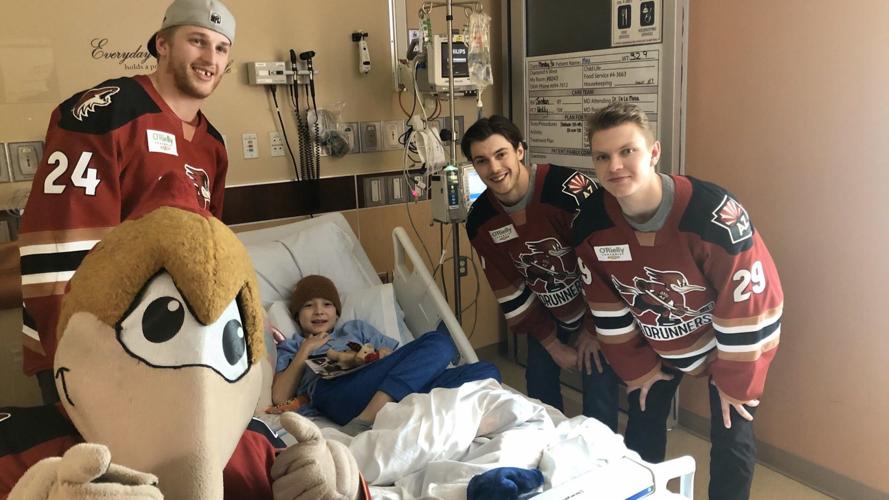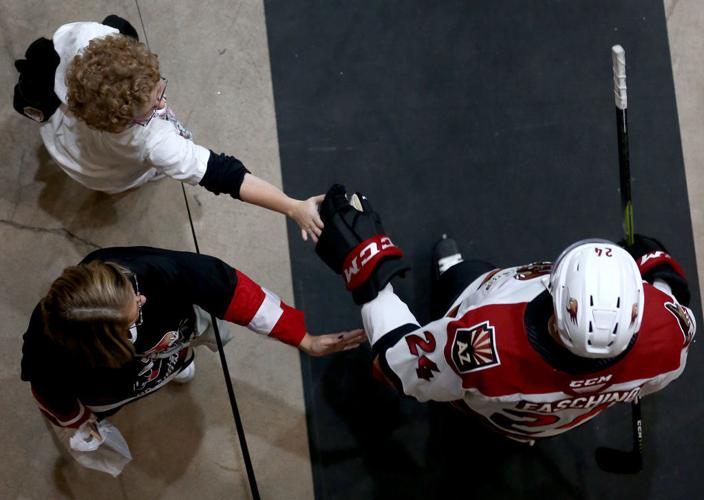It might be a few months, or maybe even years.
But whenever current Tucson Roadrunners’ forward Hudson Fasching looks back on the 2019-20 season, there no doubt will be plenty to remember.
After a slow start statistically, Fasching got hot right as his team jumped to the top of American Hockey League standings. Coincidentally enough, it took losing one of his upper front teeth during a practice drill at Tucson Arena back in November for the fire to return to Fasching’s offensive game.
Then there’s the 19 goals — at this point the best of his four-plus-year pro hockey career even without, yet, playing the final 10 games of the schedule.
And, he’ll never forget those 10 games remain (at least for now): The season stopped on a dime March 11 in concert with the spread of the coronavirus pandemic.
But just this week, the American Hockey League and Tucson Roadrunners gave Fasching something else to carry on from his already-unforgettable 2019-20 run. The AHL and the Roadrunners named the 6-foot-3, 24-year-old hailing from hockey-mad Minnesota the Southern Arizona club’s IOA/American Specialty “Man of the Year” for, according to the team, “his outstanding contributions to the Tucson community.”
Roadrunners coach Jay Varady said this week the honor is simply another notch on how Fasching “goes about his business” — both on ice, and in life.
“It’s an indication of who he is as a person. He’s a good man, who takes care of his family, his teammates and his community,” Varady said.
“Hopefully he can move forward in the process of being Man of the Year for the American Hockey League. I think he’s done a great job in Tucson, and with our team and our players in the locker room.”
Those contributions most directly connecting Fasching to this particular honor included being on call for a number of community appearances this season. Most specifically, he and some of his teammates spent significant time with young patients at Diamond Children’s Medical Center.
As Varady referenced Fasching as being “professional in all aspects of what he’s doing,” Fasching himself had one in particular word the visits to Diamond Children’s.
“Personal.”
Fasching said it’s “really helpful to have the experience of knowing what it’s like to be a family in the hospital for an extended period of time.”
He speaks from experience, certainly.
Fasching is two years older than his brother, Cooper, and three years older than his sister, Mallory. As infants, both Cooper and Mallory were diagnosed with a mitochondrial disorder.
The Faschings have shared their story over the years with many news outlets, including ESPN, USA Hockey Magazine and College Hockey News. Those stories appeared as Hudson became a prep hockey star near Minnesota’s Twin Cities, then as he went off to be part of the USA Hockey National Team Development program, and later played for NCAA powerhouse Minnesota.
The disorder meant Cooper and Mallory require 24/7 care.
It left them unable to walk or speak, but they have a deep relationship with their older hockey-playing brother.
Over the years, Fasching’s parents shared with media how Hudson’s role as superstar hockey player was often parallel to him being a loving big brother — even one of his siblings’ caretakers.
“(Hudson) could do near anything a nurse could do with Cooper and Mallory,” his father Rick told USA Hockey Magazine when Hudson was just 15 at the time, to boot.
Hudson Fasching, this week, said his own family’s experience has given him the perspective of knowing what a visit from an outsider — a pro athlete, perhaps — can mean to one of those kids at Diamond Children’s.
“You kind of have a better perspective of what (the families are going through,” he said. “Just kind of the understanding of how hard it is, and that when you go in there, it’s not easy to bring conversations up. You can’t ask how they’re doing a lot of times, because you know they’re not doing well. So you just try to find other things to distract them from the struggles they’re going through.”
In terms of the Man of the Year honor, Fasching credits the Roadrunners organization with helping him stay connected to the community in such a way.
At the moment, with the AHL season on pause, Fasching is, in many respects, still connected to Tucson — literally even. He’s perhaps the last of the Roadrunners’ players still in Tucson at this moment.
He’ll likely head back to Minnesota in May, he said; he owns a home there that’s leased for the next month or so.
But that doesn’t mean he hasn’t relished sticking in Southern Arizona a bit longer than others anyway — even as Saturday night marks what would have been the Roadrunners’ regular-season finale at Bakersfield, with an all-but-assured Calder Cup playoff run starting a few days later. (He holds out hope, of course, the season will resume in the coming months.)
He’s also relished the chance to spend some earlier-than-usual quality time with his wife Madison and their dog.
So far, they’ve challenged each other with puzzles, and by trying to teach themselves to make pasta from scratch while enjoying Tucson’s famed sunsets from their balcony.
He’s also keeping in shape — sans ice — in case the season does end up finishing out.
The season isn’t the only area Fasching is still seeking some closure or resolution, though.
He might have to wait a bit longer — maybe even another year — to get that new tooth he’s been waiting on.
Considering it’s an elective procedure, he said, and his plans to head back to Minnesota sooner than later, he might have to wait until the next time there’s a break from hockey to finally get it taken care of.
“Yeah, that might complicate my teeth situation a bit,” he said, adding as only a hockey player could, “but that comes with the territory.”






